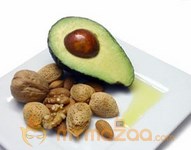1. Basic Terms:
- "Bad" cholesterol clogs your arteries and causes heart disease.
- "Good" cholesterol helps collect up the bad cholesterol and get it out of your system.
- Saturated fat is "bad fat" that increases the bad cholesterol in your body.
- Polyunsaturated fat is "good fat" that lowers both good and bad cholesterol.
- Monounsaturated fat is "really good fat" that helps lower the bad cholesterol, but leaves the good cholesterol alone.
- Fatty acids are the building blocks of fat.
- Trans fatty acids are made in the production of partially hydrogenated vegetable oils used to make margarine and many snack foods and processed foods.
- Whole foods are unprocessed food that occur in nature... nuts, meat, milk, poultry, eggs, fish, seeds, grains, rice, fruits, vegetables.
2. Why Fat is Bad:
Fat is calorie-dense, it contains more than twice the number of calories as carbohydrates. A high fat diet has been linked to several chronic diseases such as cancer and increased risk of coronary heart disease. Saturated fats can increase bad cholesterol.
3. Why Fat is Good:
It gives taste and texture to foods. Unsaturated fats can decrease the bad cholesterol in your body.
4. How Fat in Your Diet Affects You:
Fat in your food can affect you differently depending on your particular health issues.
If you are at risk for heart disease, saturated fat is something you want to avoid. According to the American Heart Association, a heart healthy diet can contain up to 30% of calories from fat, as long as most of the fat is unsaturated. More on the heart-healthy diet: Cholesterol: What You Need to Know
If you are diabetic, you want to lower the trans fatty acids and raise the polyunsaturated fatty acids. Consider reducing the amount of processed foods and increasing the amount of whole foods you consume. More on the diabetic diet: Diabetes: What You Should Know
If you are on a diet to lose weight, it's a good idea to lower total fat in your diet. Losing weight comes down to the calories in versus calories out and fat has more than twice the amount of calories as other foods.
5. Types of Fat You Should Choose:
- Polyunsaturated fats are found in flax, corn, safflower, soybean, sesame, and sunflower oils. (These nonhydrogenated fats are liquid at room temperature.)
- Polyunsaturated fats found in fish.
- Monounsaturated fats found in olive oil and canola oil.
6. Types of Fat You Should Try to Avoid:
- Any type of hydrogenated fat. This is man-made fat and you will find it in snack foods, margarine, bakery products and other processed foods.
- Man made fat substitutes like Olestra (you might find fat substitutes in fat free snack foods). Even if scientific research could solidly prove that fat substitutes weren't hazardous to your health, these products just perpetrate bad eating habits.
- Animal fats including whole milk, butter, poultry skin, and fatty cuts of meat.
Fat doesn't have to be a bad thing if you choose your fat wisely! If you can choose whole foods over process foods, you will be eating a much healthier diet. Also, for any type of special diet, use your HealthFitCounter to help you keep track of your total fat and saturated fat intake.









